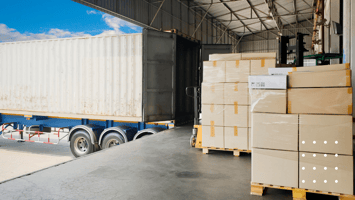International trade is a complex process. Importing and exporting goods involves customs-related...
When To Consider Third Party Logistics (3PL)
As e-commerce becomes more and more popular, international shipping creates an opportunity for businesses to thrive and grow. However, it is important to consider the logistics of shipping commercial goods; such as transport, storage and distribution. Breakdowns in any of these areas can cripple a company, let alone in all three. Because of this, many companies that experience an uptick in growth will notice that they need assistance and often consider third-party logistics companies, also known as 3PLs. However, 3PLs come with their own set of challenges as well as advantages, so it is important to understand what they are, before choosing to use one.
-1.png?width=1280&height=720&name=Orange%20Modern%20Minimal%20Blog%20Writing%20YouTube%20Thumbnail%20(2)-1.png)
3PLs enable businesses to outsource some aspects of their logistics process in order to streamline operations. The use of 3PLs became ever so common after the ecommerce boom during the pandemic, which heightened the demand for these types of services. Often, businesses can outsource warehousing, shipping and even order fulfillment under a 3PL. Essentially these third party logistics companies are entities who can take over transport and storage of goods, but not the ownership, which means they act as fulfillment or distribution services for businesses.
Some of the most common or sought after 3PL services and can be grouped into:
- Transport Based
- Warehouse/Storage Based
- Distribution Based
3PLs operate under a number of different responsibilities, including storage of the goods in a warehouse, and even organizing and sorting the goods, so that when they are purchased order fulfillment can take place. Shipping is one critical aspect of what 3PLs handle, as they make arrangements for shipping of the item through a carrier partner or their own fleet. Many 3PLs have contracts with large carriers such as UPS, DHL and FedEx. Some 3PLs even offer last mile delivery as part of their services, so brands only need to work with one logistics provider at a time.
3PL vs. Trucking Companies
While 3PL providers do often manage transportation on a company or shipper’s behalf, they are non-asset based companies, meaning they leverage a vast network of carriers and do not own usually their own trucking capacity or fleet. Some do, but not often. Trucking companies, on the other hand, are in the business of transport and tend to be asset-based, as they own the fleet and assets, such as drivers and equipment needed for shipping.
3PL vs. Freight Forwarders
Often 3PL providers work with freight forwarders to help facilitate movement of freight and a smoother transport process. Freight forwarders work in coordinating insurance, booking cargo space and transport of goods, but do not handle warehousing, inventory management, picking or packing. This means that 3PLs take care of several logistics issues, while freight forwarders work only in a specific part of the process.
.png?width=1200&height=400&name=Ivory%20Elegant%20Summer%20Fashion%20Blog%20Banner%20(5).png)
Advantages of Using a 3PL
Outsourcing to a 3PL can have its share of benefits, as it allows companies to spend more focus on product development, marketing and sales strategies. 3PLs can utilize technology efficiently and help brands grow. They connect the delivery of goods, and ensure that transport goes smoothly, due to their vast networks. The logistics issues of transport, storage and handling are taken care of by 3PL companies, and then modern software or technology is used to manage distribution and warehousing.
3PLs can help alleviate some common logistics issues, and help businesses save both time and costs associated with warehousing and transport. They help businesses by enhancing efficiency and allowing time and room for businesses to expand their market, enabling them to leverage supply chains and access new markets.
Disadvantages of Using a 3PL
While 3PLs can serve a strong purpose of helping businesses expand and cut time, there is also the risk of losing control over their goods or shipments. In using a 3PL provider, companies give up some control over delivery, and even potentially exposing their company to a data breach, given that they are sharing key information with a third party.
It still costs money to use a 3PL. Often it is difficult to establish a cost effective agreement between shipper and 3PL providers, and businesses have little control over these matters, so it can get complicated. 3PLs also have a variety of clients, so if goods require special storage requirements or have a lot of regulations, it can lead to oversights and not fully meeting the businesses needs.
How To Choose a 3PL
When choosing to use a 3PL, you will want to be very careful in your process. Look into several factors that your business will require, and decide based on individual needs. Consider some of the following components in your decision:
- Their capacity to handle your volume of goods as you grow
- Do they provide real-time data and tracking of inventory levels in the warehouses
- Can they provide fulfillment data, KPIs and delivery time averages
- Do they provide discounts for shipping rates
- The shipping and carrier options available to you
- Do they have ability to synch with your online store or other platforms
Should You Use a 3PL?
For companies who are in the ecommerce business and require distribution, storage and transport needs, then considering a 3PL is valid. However, if shippers want to control majority of their logistics process and storage of goods, then choosing to work with a trucking company directly for transport needs will allow more control and efficiency. Some shippers may choose to use brokers, who have a greater network or access to truckers or trucking companies. However, when wanting to use the latest technology, 3PLs do provide access to resources or technology which is costly, so shippers do not have to buy or set up the technology themselves.
Using a 3PL company is a matter of choice and individual business needs, and it is important to consider the business itself. Look into whether a 3PL can streamline your process and whether financially you will come out on top or will lose out instead. Ideally, companies which are growing at a quick rate may benefit from a 3PL because manufacturing and staffing needs may not be able to keep up with the demand for the goods. The flow of goods is streamlined with the use of a 3PL, which can help alleviate some common issues for businesses. However, if you or the company want to be closer to the fulfillment centers or have more control over the process, then 3PLs can get messy and may not be ideal.
Whether you're a small business or enterprise company, there's a lot to consider when deciding whether a 3PL is right for your business. Don’t rush the process, rather go over your plans and your budget. There are many reasons to outsource certain tasks and operations, but the most important thing is to first understand your needs and what they entail. There are pros and cons to outsourcing, but it’s important to weigh them carefully

.png?height=200&name=Ivory%20Elegant%20Summer%20Fashion%20Blog%20Banner%20(11).png)

.png?height=200&name=Colorful%20Modern%20Travel%20Facebook%20Cover%20(1).png)